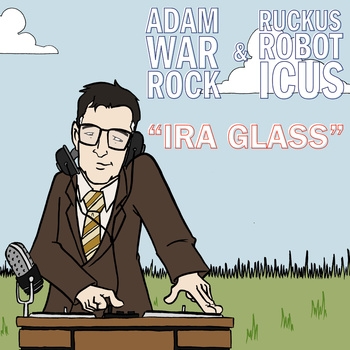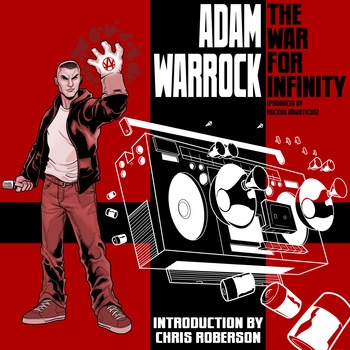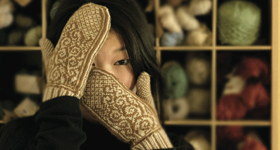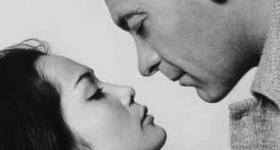When I first talk with Adam WarRock -- the Korean American attorney turned geek/pop cultural rapper who won the top prize at this year's Kollaboration Atlanta and is currently rocking the mic at a comic book convention near you -- we hesitate to discuss our possible mutual acquaintances.
WarRock, aka Eugene Ahn, and I are both alums of Ohio State University, graduating within a few years of each other. When we try to float out names of people we may know, I awkwardly stammer about not having been in the Asian American scene on campus. [Does sitting through a hanbok-and-modern-Korean-American-clubwear fashion show count? No? Ah.] To my relief, WarRock had a similar response and commented on the irony our situations: "It’s funny you say you weren’t involved in the Asian community and yet you’re now a blogger for Hyphen magazine," says WarRock. "And I’d say the same thing and now I’m being interviewed by said magazine."
WarRock is perceptive, to say the least. Aware of the pitfalls of being boxed in as part of the nerdcore scene when he raps about This American Life's Ira Glass or X-Men or labeled strictly as an Asian American artist when he discusses race and identity, the 30-year-old Memphis resident takes a more intuitive approach to making music: do whatcha like.
I caught up with WarRock while he was in between show dates to nerd it up about hip hop, politics, and growing up in Middle America.
If you had to write and illustrate the moment you told your mom you were quitting law to become a rapper, would it be a tragedy, comedy or an extended fight scene?
It would be like one of those TV shows that is neither comedy nor drama exactly. It wasn’t a tragedy and it wasn’t a fight; that happened when I decided to go to law school because I didn’t really have much direction, I guess, through college. And I didn’t really know what I wanted to do. And I actually had a chance to do music back when I graduated college and I didn’t necessarily want to do it as a career. But my parents definitely didn’t want me to do that as a career.
I worked [as a lawyer] for three years and my parents kinda knew how much I didn’t like it. I’m pretty close to my mom and my dad is, you know, a typical, quiet Korean man. She knew how much I didn’t like it so it wasn’t a surprise that I left. I think it was a surprise that I was gonna do what I did. I kinda sorta fudged exactly what I was gonna do until I had more success. I told them I was gonna do some online business stuff [laughs]. And I was like, “It’ll work out. Don’t worry about it. I have some savings ... I’ll survive.” And after I could show my mom these magazine articles and things in newspapers ... she’s very excited about it.
You grew up in Pittsburgh and Memphis and went to school in Ohio and Georgia. How has growing up in these areas that are less populated with Asian Americans shaped your perspective in life and in your music?
It was weird. For Pittsburgh, I was there for about ten years; I was born in Pittsburgh. We had a lot of family there so I never really was without Asian people. But when I moved to Memphis when I was ten, I was in third grade. It was like that stereotypical "I was only one of two Asian kids in my entire grade" kind of thing. I don't have any horror stories of racism but it kinda made me very acutely aware that I was always different. ... I kinda got it from all sides. I'm not exactly Asian, not exactly like these southern white guys or girls are, and then I was really into hip hop and wore Mecca jeans and Enyce sweatshirts. All my black friends were like, "This is kinda weird because you're not exactly like a hip hop urban kid either." It made me pretty independent. I was kinda floating from circle to circle but was never in one.
It's funny because it's like I started getting more into Asian culture when I was in college but to this day I still have these weird self-identity things. When I was working as a lawyer one of my friends asked if I was interested in doing this Minority Liaison position for one of the offices in Congress. Later I was talking to some friends online and I said, "I don't know why she would pick me; it doesn't make any sense." ... And then literally in the middle of it I was like, "Oh man. I'm a minority! That's why she picked me!" It's about how growing up made me feel about my identity. I don't think I'm anything; it's just kind of this blank slate in my head, you know?
As for the music, that's what I think too. I make kinda geek music, pop culture-y music. And I also am Asian. I never wanted to be seen as this nerd rapper and I never wanted to be seen just as an Asian American artist. I don't mind those being a part of it, but it was pretty much like I just wanted to make music and put it out there and not try to think of what kind of music it would be.
That's kind of the funny thing about the "Angry Asian Man" song. What that song kinda means is that I'm thankful that there are people like Phil [Yu], there are people like Hyphen, there are people who do this stuff because I can't hold up that banner all the time. ... [It's a] kinda subversive, interesting perspective from me growing up in the South and places where there aren't that many Asian people necessarily.
There seems to be a separation between hip hop for the mainstream and hip hop for geeks, even though it seems like some of the biggest mainstream rappers are, in fact, huge geeks, like Lil' Wayne, Nicki Minaj, Kanye West. They're very pop cultural in their lyrics. Why do you think there's such a delineation between what's for mainstream rap fans and what's for geek rap fans?
It's just because of the history of where hip hop came from. Being a nerd is a thing of privilege. You can’t care too much of how your favorite Buffy the Vampire Slayer episode is the best if you’re, like, struggling to put food on the table. Where hip hop came from, like the Bronx and west coast, were places where people who were struggling economically.
We all remember when it [hip hop] was like a fad; it was violent it was angry. And it's been like twenty years since then probably and ... it's really interesting because if actually do you listen to the three people you named, they really don't seem [to have] as much gangster posturing as there used to be. A lot of their stuff is very personal. A lot of Kanye's stuff is intensely personal. It's how much of an asshole he is or how much money he has or whatever.
It's funny because people have never really switched over [as hip hop fans] because I think a lot of people who were around the age that we're at and older still remember rap as being very aggressive and violent. And it's interesting that there's a generation of people, a generation of kids, who are now coming up and they grew up in an era where rap wasn't always a fad, rap wasn't always violent, rap wasn't always exclusively black.
And it's interesting too when you think about nerdcore. There was a whole first wave of people who made nerdcore like MC Frontalot, MC Lars, MC Chris and they made music in the attempt to not sound like rap. They wanted very much to make their own style of music but rap with rhymes and make it about the stuff that they knew. There's now this second wave of guys that are coming up who are nerdcore rappers and geek musicians, too, who don't try to make things sound as different. We try to make things that sound like rap, like regular rap music that we grew up listening to. It just happens to be about that stuff. ... People are only starting to realize that there may be nerdcore stuff out there that they might like even if they don't consider themselves nerdcore or hip hop fans.
"Angry Asian Man" is a very personal song. How do you balance those types of songs with the more pop culture heavy tracks?
I don't know. I just kinda write stuff [laughs]. Doing this full time and having a home kinda set up, whenever I get an idea I can just kinda pop up and do something. And sometimes it's just the beat. Sometimes the music makes me feel like it needs to be more personal. I think there's always a lot of personal stuff in the music. Talking about being a nerd or a geek is very personal; it's very much an admission of "I don't know why people think I'm different." Which is funny because that is very much like an aesthetic to the whole race discussion. A lot of that comes from the fact of "I don't know why people thought I was different; I'm the same as the people who are white or black; but I'm still thought of as different because I'm Asian."
The nerdy stuff that comes out of it and a lot of comics a lot -- most if not all comics are somewhat about "I don't know why I'm different, I don't know why these people don't like me, I'm gonna overcome my weaknesses or my past or something like that" -- so it all kind of weaves in together when you start writing about things because you start to find the emotion in things, this underlying current for everything. It just depends on what I'm writing about that day but sometimes I think a nerdy song is gonna turn out really nerdy but it comes out really personal. Sometimes I'm starting to write a personal song and it becomes more about nerdy things and it just kinda happens.
Some of your songs, like "I Believe in Harvey Dent", are actually very political despite outwardly being about comic book characters. Do you think your fans are connecting with the political aspect of your music or are they more into the pop cultural references?
I have no idea if they are; I hope they are. If not, I am forcibly making them be aware of it, I guess [laughs]. When I make songs, there are a lot of songs about very personal things, very nerdy funny things. Sometimes you want to make a song that's angry, right? It's like that's the gift you are given in hip hop. Other than, like, thrash metal it's probably the most conducive [genre] to being angry and speaking out against something, like Public Enemy or someone like that.
But like when you rap really angrily and aggressively about really frivolous stuff you sound really empty. Whenever I make an aggressive song it tends to veer into things I'm pissed off about in politics. It's either like I hope people like it, I hope you like a little more intelligent stuff in it. But then like sometimes I don't care; I'm just shoving medicine down their throats [laughs]. Because sometimes you have to say something that is important and there's no other way to do it. "Harvey Dent" was definitely a song that I'm glad people liked. And I'm glad that it is so ridiculously political and it calls out Obama and all the pundits and things like that. It makes me feel like people can be more aware. But it's still a rap song. It's just fun to be angry and have this megaphone that you can yell things into.
What movies, comics, or artists are you into right now?
Right now I am totally completely obsessed with the television show Justified, because I'm so happy that there is a drama, a serious drama, that shows a Southern culture in a serious way. Growing up in Memphis, I am a Southern boy at heart. My formative years were here, I have a little bit of a twang in me. I've seen the rural parts of Tennessee, Arkansas, Mississippi, I love that. I didn't realize how much I had been hungering for a show that could take a Southern aesthetic and make it awesome.
I really like Atmosphere, it's a hip hop group from Minnaepolis. They're probably one of the biggest influences on me through college and they just came out with a new album.
As for movies? It's funny because the more that I've gotten into being a geek, which has always been there but has obviously intensified lately, the less I am totally stoked for summer blockbuster movies, you know? Because I'm so much more aware of how they can screw it up [laughs]. In the past, I would have seen the Thor movie or the Captain America movie and be like "Oh, this is gonna be so awesome" regardless of anything around it. But now all I know is, "Oh, I really like this run of the comic" or "I like it when this guy writes it, I hope they include this, I hope they don't screw this up." It's become this like burden of knowledge.
But I am probably more excited for Thor than I am for Captain America just because I really like Thor and I really like Kenneth Branagh.
So what's next for you?
Since November I've been traveling a lot and doing shows. I do a lot of comic conventions, too. There's a lot of smaller, niche-ier comic cons other than the big San Diego one, which me and two guys who run a website called Let's Be Friends Again table at together. I have an EP coming out on May 17 which ironically in the most literal sense is the anniversary of the day I officially quit my job. I did that completely by accident, like I had no idea. I have another big project that's coming out at the end of the year but I can't talk about that yet. It's gonna be another free mixtape like I've done before but this one is probably gonna be the biggest yet.
What would it take for you to write a Hyphen magazine song?
Nothing at all! You just have to ask, that's all you have to do. And you have to give some guidance. I don't consider myself to be the most savant or aware person about everything Hyphen, but if you want a song, all you have to do is ask and I will do it if I have good beats and an idea. Hyphen is a very cool word and I could play with that a lot. You just give me the information and I will churn out something that will be totally awesome.
My publisher will totally love me for asking that question.
Adam WarRock's most recent album The War for Infinity is available now. Check out his website for future shows, songs, and mixtapes.












Comments